These bedtime short story for kids and for adults do more than lull you to sleep — they tap into reflection, solace, and quiet wonder. If you’re seeking more from your nightly reading, explore our Gentle Fantasies & Whimsical Worlds series on InspiredNap or drift through our Philosophical Narratives collection, both designed to soothe and awaken the inner imagination. For further reading about the benefits of storytelling for adults, check out this article on The Atlantic about how narratives support mental wellness.
In today’s fast-paced world, adults are rediscovering the quiet magic of nighttime storytelling. These tales, often soothing, introspective, or gently imaginative, provide a much-needed pause from the stress, noise, and mental clutter of daily life.
Here are the Top 5 most-loved bedtime story types by adults.
Type 1: Calming Nature Stories
These are peaceful bedtime stories set in nature. They’re designed to relax the mind and soothe the heart through slow pacing, soft imagery, and gentle emotional flow. Perfect for bedtime, they help adults drift off by creating a sense of quiet belonging in the natural world.
A Train Ride Through the Snowy Mountains
Elara boarded the train just past twilight. The sky had turned a pale silver-gray, with snow falling in thick, slow flakes that made the world seem hushed and reverent. The station was almost deserted with just a few others waiting, their breaths fogging the air like tiny ghosts of thoughts unspoken.
She stepped into Carriage C and found her seat by the window exactly where she liked to be. The seats were a deep green velvet, the kind that remembered your shape and welcomed you back each time. Her coat was still cold from outside, but the warmth of the carriage began to seep into her bones the moment she sat down.

The train lurched softly into motion.
There was no rush. This train wasn’t built for speed. It was made for slowness. For people who had forgotten how to breathe slowly. For people who needed to let go without realizing that’s what they were doing.
Outside, the snowy world moved by like a dream one that didn’t ask to be understood.
The pines stood tall and watchful, their branches heavy with snow that glittered like crushed pearls. The mountains loomed in the distance, stoic and silent, shrouded in mist and memory. Frozen rivers carved lazy lines through valleys that looked untouched by time.
Elara pulled a small thermos from her bag spiced cinnamon tea. She unscrewed the lid and the aroma drifted up, mingling with the faint scent of cedarwood coming from the train walls. She wrapped her fingers around the cup and sipped, letting the warmth unfold inside her like a memory she’d nearly forgotten.
A gentle voice spoke over the intercom:
“This is the slow line to Haldenridge. Arrival time: whenever you’re ready.”
Elara smiled.
No one expected her. No one needed her to perform. No one was tracking her arrival.
She pressed her forehead gently against the glass. The coldness startled her at first, but then calmed her, like a reminder that she was really here not in her head, not in her inbox, not inside someone else’s urgency.
The carriage was nearly empty. Across from her, a man in his sixties read a leather-bound book with gold edges. He hadn’t turned a page in over ten minutes. A few seats down, a couple sat side by side, their heads leaning together like swans resting. In the far end of the car, an old woman knitted a red scarf, her needles clicking softly like a lullaby in Morse code.
No one spoke.
No one needed to.
They were all riding the same unspoken truth that this journey wasn’t about where they were going. It was about how it felt to go slowly, without pressure, without measuring worth by motion.
The train curved along a ridge, offering a breathtaking view of a frozen lake below. It looked like glass, like a mirror to a quiet sky. At that moment, Elara felt her chest unclench something that hadn’t happened in months. She didn’t even realize how long she had been holding on. Holding her breath. Holding herself together.
The rhythmic sound of the train tracks echoed in her body like a mantra:
You are safe.
You are here.
You are enough.
Time passed, though she wasn’t sure how much. An hour? Two? She could’ve sworn she slept with her eyes open.
At one point, a conductor walked by. His uniform was old-fashioned navy blue with brass buttons and a soft wool scarf. He tipped his cap as he passed.
“No ticket needed,” he said, his voice like warm toast. “Just trust.”
Elara smiled again. It felt like the first real smile in weeks.
The snow thickened outside, but the windows stayed clear, offering a perfect view of a world painted in silence. Trees passed by in slow motion. Villages with tiny glowing windows flickered into sight and then faded again, like lanterns in a memory.
Finally, the train began to slow.
The intercom spoke again, gently:
“This is where we let go. Thank you for traveling slowly.”
The train stopped not at a station, but beside a field of unmarked snow. No signs. No platform. Just quiet, and the soft sound of the engine purring to rest.
Elara didn’t know what town this was.
She didn’t care.
She stood up slowly, as if not to startle the peace inside her. The man with the leather book was still reading the same page. The woman had finished her scarf and now cradled it like a sleeping kitten. Outside, the world waited with open arms.
As Elara stepped off the train and felt snow beneath her boots, she realized something beautiful:
She had nowhere she needed to be.
She was already there.
🕯️ Moral:
Peace doesn’t come from arriving faster it comes from noticing the snow, the silence, and the self that’s been with you all along.
The Garden That Bloomed at Midnight
In a faraway village hidden between the folds of green hills and slow-turning seasons, there was a tale soft as a whisper that passed from one generation to the next. They spoke of a garden that only bloomed after the world had fallen asleep. It didn’t appear on maps. No one had ever found it with a flashlight or a plan. It revealed itself when you weren’t looking.
And so, most thought it a myth. A beautiful bedtime story to lull restless hearts.
But not Amira.

She was the kind of woman who believed in things that couldn’t be seen in daylight like soul echoes, the hush between raindrops, and flowers that opened only to moonlight.
She lived alone in a little wooden cabin on the edge of the forest, where owls nested above her roof and wind chimes spoke in riddles. She worked in the village by day, repairing old books and painting walls with wildflowers and lullaby colors. But at night especially when the stars hung low she wandered.
Not searching. Just walking.
That was how it had to be. The garden, the legend said, came only to those who weren’t chasing it.
One still night in early spring, when the air was damp and full of the smell of turned soil and soft moss, Amira felt a strange warmth inside her chest not heat, exactly, but a calling. Like her heart remembered something before her mind did.
She followed the feeling.
No lantern. No phone. Just her breath, her bare feet, and the quiet.
The forest didn’t creak that night. It hummed.
Soft pulses of sound like the heartbeat of the earth itself led her to a place she’d never seen before, though she had walked these woods for years.
There, beneath a silvery moon and wrapped in the glow of mist, stood an archway made of twisted vines and tiny golden blossoms. It wasn’t there the day before. It might not be there tomorrow. But tonight it waited.
She stepped through it, and the world shifted.
It was not like stepping into another place.
It was like stepping into a memory you didn’t know you had.
The garden was wide and endless, bordered by tall hedges made of blue-green ivy that shimmered under the moonlight. Flowers bloomed in every direction not loudly, not for display but softly, as if they were breathing. Petals glowed faintly, as though someone had painted stardust into their veins.
Lavender bushes whispered lullabies when the wind passed. White peonies released a sigh of warmth. Giant lotus flowers floated on still pools, opening their hearts to the night sky.
And not a single sound of the modern world intruded.
No cars.
No phones.
No clocks.
Only the natural rhythm of a place untouched by urgency.
Amira walked barefoot along a path of moss and silver stones. Each step felt like healing. Each breath is like something old leaving her body.
She came to a tree tall and silver, with leaves that twinkled like the inside of a dream. Beneath it sat a wooden bench carved with stars. She sat, not because she was tired, but because the moment asked for stillness.
From her perch, she watched.
A fox padded silently across the path, its fur a mix of cream and copper. Moths with luminous wings danced gently above the lavender. The moon dipped lower, casting long shadows like soft silk across the earth.
And then she noticed the flowers seemed to open more fully when she was still. As if the garden rewarded her patience with beauty.
She didn’t speak. She didn’t cry.
She simply existed.
For the first time in years, she felt completely herself no roles, no obligations, no mirrors. Just the quiet witness of life unfolding at its own pace.
Minutes passed. Or was it hours?
Eventually, the stars began to fade and the sky turned from indigo to gentle gray. A mist rose, delicate and sleepy. The garden began to fold inward, flowers slowly closing their eyes, vines curling back toward their roots.
The garden was going back to sleep.
And Amira understood.
This place wasn’t meant to be owned, captured, or photographed. It was a moment. A gift.
She stood slowly, gave a bow to the tree, and walked back the way she came. The archway of vines dissolved behind her. No trace remained.
When she stepped out into her forest again, the birds had begun to sing.
The garden was gone.
But Amira wasn’t the same.
From that night on, she moved differently. Spoke softer. Painted with more wonder. People said her voice felt like honey and stars. Children came to her for bedtime stories. Grown-ups came for tea and left with full hearts.
And every now and then, when she walked at night, she could smell lavender in the breeze and she smiled.
Because she knew.
The garden was always there.
Waiting.
Not to be found but to be remembered.
🕯️ Moral:
Sometimes the most beautiful parts of life bloom only when the world is quiet and you finally allow yourself to simply witness it.
The Tea House by the Sea
At the very edge of a sleepy coastal village past the crooked cobbled lanes, the tide-washed fishing boats, and the old lighthouse with a flickering soul there stood a small wooden tea house, nestled right where the land sighed into the sea.
Its name was never on signs. Maps didn’t mark it. Locals simply called it “The Place That Knows.”
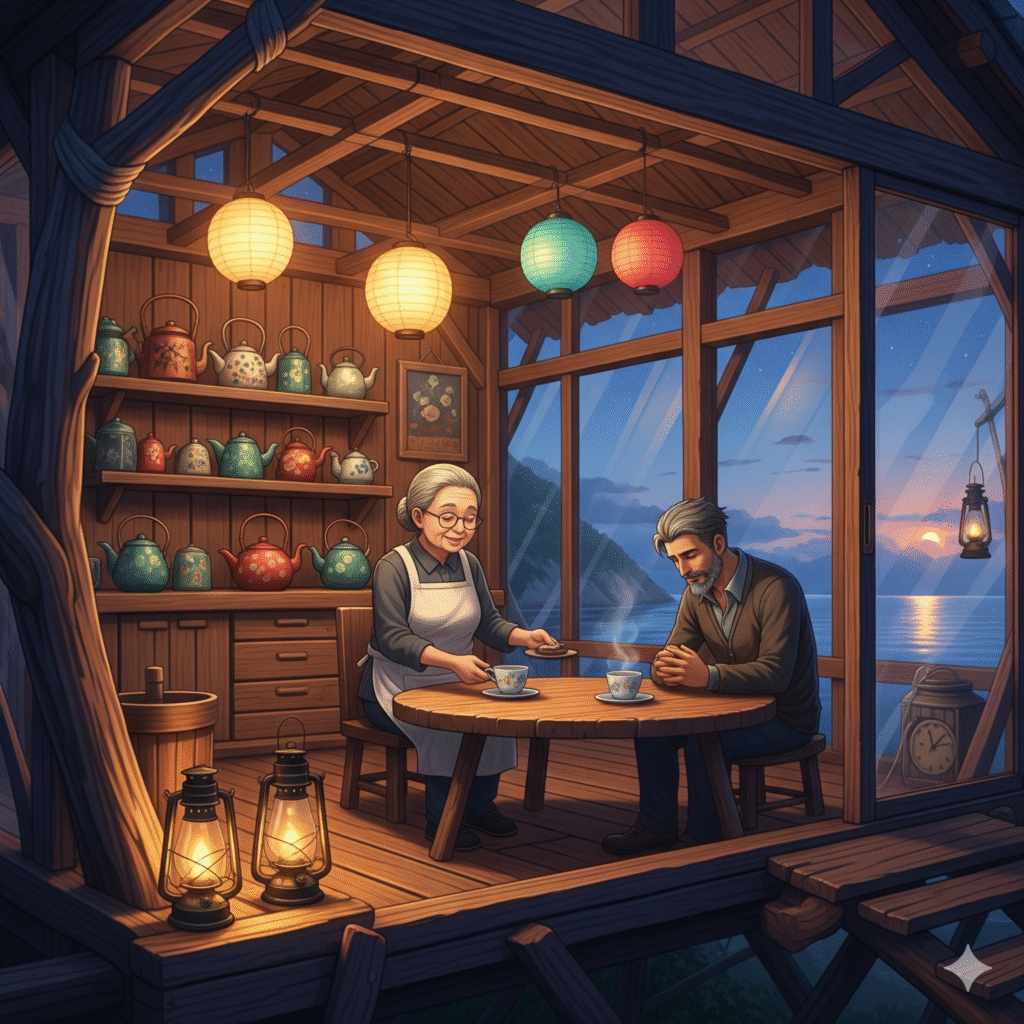
Because somehow, when you needed it most whether your heart was too full or far too empty you’d find yourself standing at its door, even if you hadn’t meant to walk that way.
That’s how Jonas found it.
He had come to the coast after a storm in his life the kind without thunder or rain, but with just as much ruin. Years of work had left him successful but hollow. His calendar was full, but his spirit was not. Sleep came late and left early. His mind spun in loops even silence couldn’t untangle.
So, one restless evening, he wandered along the beach, salt in the air and the horizon stretching like a soft question. His shoes in hand, his coat catching the breeze, he walked without direction.
Until the sound of a small bell caught his attention a gentle thing that felt like being called home by a memory.
He turned and saw it: a modest tea house built from driftwood and glass, perched just above the shoreline. Warm yellow light poured from its windows. Soft music drifted into the wind, more feeling than sound.
He stepped inside.
The scent hit him first jasmine, citrus peel, chamomile, cinnamon, and something he couldn’t name but felt deep in his chest. The kind of smell that felt like being held.
The space was quiet but alive. Shelves lined with hand-painted teapots. Paper lanterns swaying ever so slightly. Tables were arranged not for efficiency, but for comfort small corners where people could lean into themselves and disappear into a cup.
Behind the counter stood a woman older, eyes like sea-glass, smiling like a memory you forgot you missed.
“Welcome,” she said, as if she’d been expecting him.
“No menu. Just tell me how your heart feels.”
Jonas blinked. “Tired,” he admitted. “Not the kind of sleep fixes.”
She nodded slowly, thoughtfully. “Then you’ll want the stillness blend.”
He watched as she prepared every movement deliberately, gently. She scooped dried petals and leaves with care, as if she were building a poem. Steamed the water until it sang softly. Poured it into a pale green ceramic cup and placed it in front of him with both hands.
He took a sip.
And the world slowed.
It wasn’t just the taste though it was earthy and floral, with a hint of sweetness at the end. It was what it invited. With every sip, he could feel his chest unclench, his breath settle lower into his belly. He heard the sea through the wooden walls, the heartbeat of the tide, the hush between waves.
Time softened.
Around him, others sat in their own corners reading quietly, staring out the windows, resting their eyes. A couple held hands in silence. An old man wrote poetry on napkins. A child sat in her mother’s lap, both sipping from the same cup.
There was no talking unless needed.
No rush to leave.
No pressure to perform.
Just being.
After his second cup, the woman returned. “Would you like a refill?”
“Yes,” Jonas said, but he wasn’t talking about tea. She seemed to understand.
She poured again, this time adding a slice of something candied. “This one’s for warmth,” she said. “Not just the body kind.”
He stayed until the sky turned ink-blue and stars pricked the horizon like tiny truths.
When he finally rose to leave, the woman handed him a tiny cloth bag filled with dried leaves, stitched with sea-blue thread.
“For the nights when your thoughts are too loud,” she said. “Breathe it in. Let it remind you that even storms serve the sea.”
Jonas walked back along the beach, the tea warming him from within. The tide whispered at his feet. The sky exhaled.
That night, for the first time in a long while, he fell asleep with a calm mind. And every night after that, when the weight returned, he brewed a small cup from that little cloth bag, closed his eyes, and remembered:
There’s a place where stillness waits for you.
You don’t have to earn it.
You only have to arrive.
🕯️ Moral:
Peace doesn’t have to be loud or complicated sometimes, it’s a warm cup and the permission to pause.
The Lighthouse Keeper’s Secret Room
On a jagged cliff where the sea kissed the rocks with eternal patience stood a lighthouse, tall and white, with its lantern turning slow circles in the sky. It had guided ships for over a hundred years, through fog, storms, and starless nights. Sailors swore they could feel the calm of its light long before they saw the shore.
Few ever met the keeper.

People in the nearby village said he rarely came down the hill. They spoke of him with soft respect, like one speaks of someone who keeps a sacred ritual. His name was Theo, and though no one knew much about him, they knew he never let the light go out not once, in all the years he’d tended it.
But what they didn’t know was this:
The lighthouse held a secret room, and only Theo knew how to find it.
He had discovered it by accident, many years ago, when he was still young and uncertain, just learning the ways of the lamp and the sea. One stormy night, while inspecting the base of the tower, he had leaned against a section of wall and it moved. A stone clicked. A soft creak echoed. And then the wall opened into a room not marked on any blueprint.
Inside, the world changed.
The air smelled of cedar and salt. The walls were lined with shelves filled with books, glass bottles holding bits of sea glass, and paintings that shimmered like they were alive. There was a fireplace, always warm, though Theo never lit it. A worn armchair faced a window that didn’t exist from the outside. And through that window no matter the hour the sea glowed in soft golds and blues, like sunset and dawn had made peace.
He stepped inside, breath caught in his chest.
The room welcomed him not with sound or speech, but with a presence. A stillness that wrapped itself around his tired edges and said:
“Here, you don’t need to carry everything.”
Theo had never truly belonged anywhere. Not in the city he was born. Not in the homes he passed through. But here in this lighthouse, in this room he felt held.
From that night on, whenever the world inside him became too loud, too tangled, too weary, he would slip into the secret room. Sometimes he would read books that weren’t there the day before. Sometimes he would write letters and feed them into a small brass mailbox on the wall letters to no one, or maybe to the ocean. Sometimes he simply sat, watched the glowing sea through the enchanted window, and listened to his own breath returning home.
Years passed. The world changed.
The village grew quieter. The ships fewer. Technology replaced most lighthouses, but this one stayed because somehow, ships still needed this light. Theo still climbed the spiral stairs each night, still turned the lens, still tended the flame.
And the room remained, unchanged by time. It was not just a space it was a rhythm, a sanctuary, a mirror of calm.
One rainy autumn evening, a knock came at the lighthouse door something that hadn’t happened in over a decade. Theo opened it to find a young woman, soaked to the bone, backpack sagging, eyes wide and lost.
“My car broke down,” she said. “The fog… I don’t know where I am.”
Theo gave a kind smile. “You’re somewhere safe.”
He invited her in, made tea in a chipped kettle, lit the little stove. She was a writer, she said, or had been. The world had become too fast, too sharp. Her words had dried up. She’d come to the coast hoping silence might return her voice.
Theo listened. Then, something moved in him something he hadn’t felt in years.
He walked her to the base of the tower, pressed a hand to the stone.
It opened.
The young woman stepped inside the secret room, breath stolen by the beauty of it. She ran her fingers along the books. Sat by the window. Watched the impossible sea. When she turned to speak, Theo was already gone back to the light, back to his watch.
He knew the room would care for her, the way it had cared for him.
She stayed for three days, wrapped in the warmth of stillness. When she left, she didn’t speak of the room only thanked Theo and walked away with lighter steps, her eyes full of poetry again.
And so, the room remained.
Sometimes, when the world forgets to be gentle, it opens again not for everyone, but for those who need it most. A weary teacher. A grieving sailor. A mother who had forgotten her own name in the noise of care.
And the lighthouse keeper now older, hair silver as sea-foam still keeps the light.
Still holds the silence.
Still tends the door to the room the world doesn’t know it needs.
🕯️ Moral:
True healing often happens in the quietest places when we stop trying to fix and simply allow ourselves to rest in the light.
The Train to Nowhere
There is a train that doesn’t run on any known schedule.
It doesn’t show up on boards.
It doesn’t have a ticket booth.
And no one really remembers boarding it.
Yet, when the world becomes too heavy when the city’s noise clings to your bones, when your mind is a maze of unfinished thoughts you may find yourself standing at an unfamiliar platform, holding a warm paper ticket that simply says:
“Nowhere → Everywhere”
That’s how Lena found it.

She had spent the last four years grinding. Finishing law school. Holding down two jobs. Caring for her sick mother. She moved like a machine efficient, dependable, always “fine” when people asked.
But inside?
Her soul had become a room with no windows.
One night, after another long day of doing everything and feeling nothing, she fell asleep fully dressed, her bag still clutched in her hand. And when she opened her eyes again…
She was on a train.
Not a subway. Not a commuter car.
A vintage train beautiful, strange, glowing with soft golden lights. Velvet seats, polished wood, large windows through which the stars moved sideways. Not like they were passing through night more like they were passing through dreams.
A kind conductor walked down the aisle. His hat was too large, and his eyes too kind to be real. “Tea? Or quiet?” he asked with a grin.
“…Quiet,” Lena whispered.
He nodded once, bowed, and disappeared.
There were other passengers, each lost in their own stillness. A painter watching the clouds change color. An old man humming as he carved a bird from wood. A dancer stretching silently in the aisle, every movement a slow sigh.
There were no announcements. No questions. No phones. No rush.
Just presence.
Lena leaned against the window. Outside, the train passed landscapes she’d never seen and yet somehow remembered. A lavender field that moved like waves. A forest with trees that whispered in a language just under hearing. A desert where time folded in on itself like a soft blanket.
With every mile, her shoulders dropped a little more.
She walked the train, discovering compartments like pages of a book. One was filled with floor cushions and soft music a library of dreams, where every book told a story from your own heart. Another held a glowing koi pond where passengers dipped their feet and said nothing. One was a café with warm pastries that tasted like childhood summers.
In one compartment, she found a writing desk and blank paper. Without thinking, she sat down.
And for the first time in years, she wrote.
Not for work. Not for deadlines. Just to listen to herself.
Pages poured from her hands. Poems. Letters to her mother. Thoughts she didn’t know she still carried. Feelings she hadn’t dared feel.
The train didn’t ask for anything. It didn’t heal her.
It simply gave her space.
Hours passed. Or maybe days. Time didn’t obey the rules here.
And then gently a voice came over a soft speaker:
“Dear traveler, we are approaching Everywhere.”
The train slowed. The stars faded into dawn.
Lena looked around. The other passengers gathered their bags, smiled softly at one another, and began to rise.
She stepped off onto a quiet platform surrounded by wildflowers and birdsong. A small path curved away into the trees.
She turned back but the train was already gone.
In her hand was a slip of paper. On it, only four words:
“You were never lost.”
🕯️ Moral:
Sometimes the best way forward is to stop moving and simply let your soul catch up.
2. Nostalgic & Healing Tales
These stories focus on emotional reflection. They revisit childhood memories, old homes, lost connections, or personal growth through a soft, storytelling lens. Often, a character returns to something they left behind and finds healing there.
1. The House with Blue Shutters
Returning to Forgotten Roots
Maya hadn’t seen her childhood home in nearly twenty years. Life had swept her far away to the city, to jobs, to relationships that came and went. But when her father passed, she felt a tug inside her chest, pulling her back to the little town by the river.
The house stood waiting, its once-bright blue shutters faded to the color of worn denim. Ivy curled along the porch, and the wooden steps creaked just as they did when she was a child.
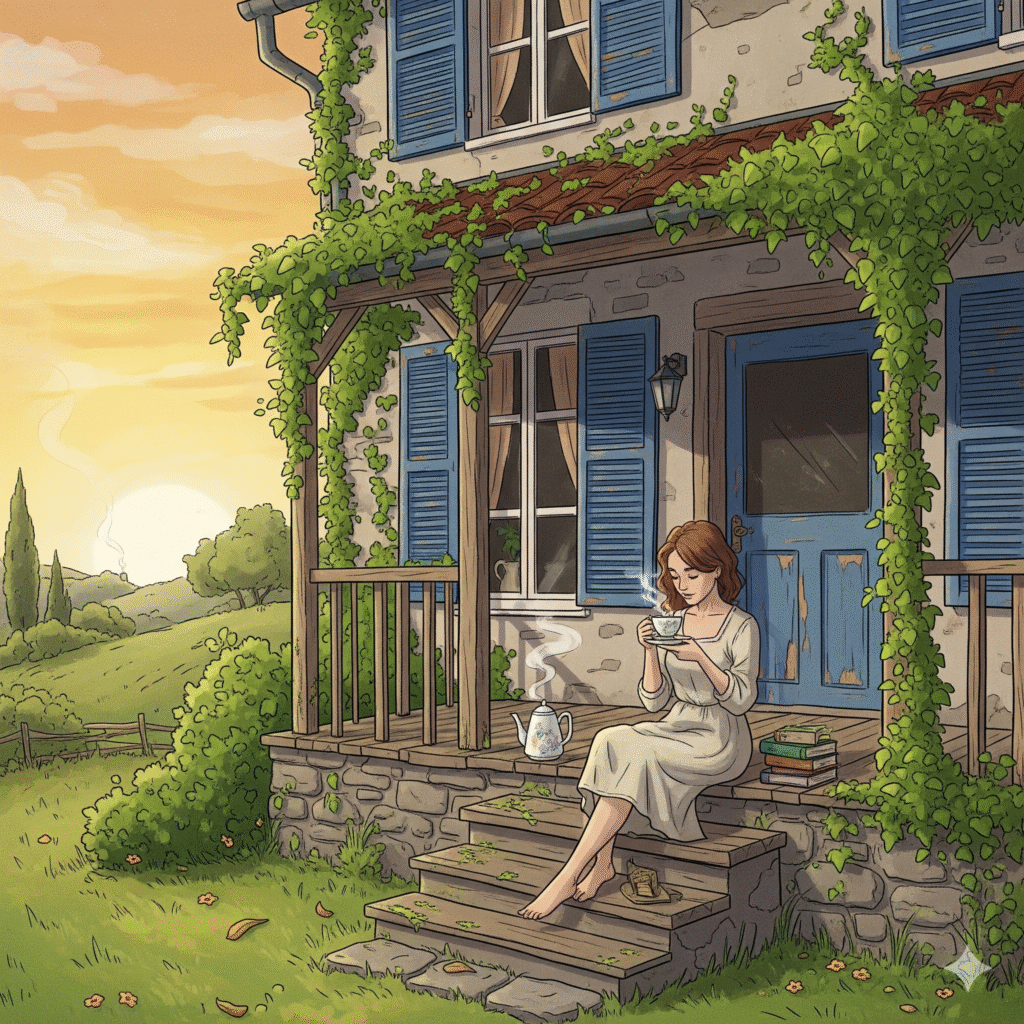
Memories in Every Corner
Inside, everything was smaller than she remembered the kitchen table where her father used to hum while chopping vegetables, the old fireplace that smelled faintly of cedar smoke, her bedroom walls where faint outlines of glow-in-the-dark stars still lingered.
She found herself running her hand along the bannister, as though touching the wood could return her to those easier days.
The Box in the Attic
In the attic, she found a dusty box labeled “For Maya.” Inside were her childhood sketches, her first diary, and a music box shaped like a carousel. When she wound it, the tune wavered but still played the very song her mother used to hum as a lullaby. Tears welled in her eyes.
Healing in Stillness
For the first time in years, Maya didn’t rush. She sat on the porch steps, sipping tea, watching the river flow by. She realized the house wasn’t just bricks and wood it was a keeper of her joy, her sorrow, her growth.
Moral: Sometimes we must return to where we began to remember who we are.
2. The Library That Waited
A Childhood Refuge
When Daniel was a boy, the old village library was his safe place. The towering shelves, the smell of paper and ink, the soft ticking of the grandfather clock it all made him feel less lonely.
Now, years later, after a burnout at work, he found himself standing outside its ivy-covered entrance once again.
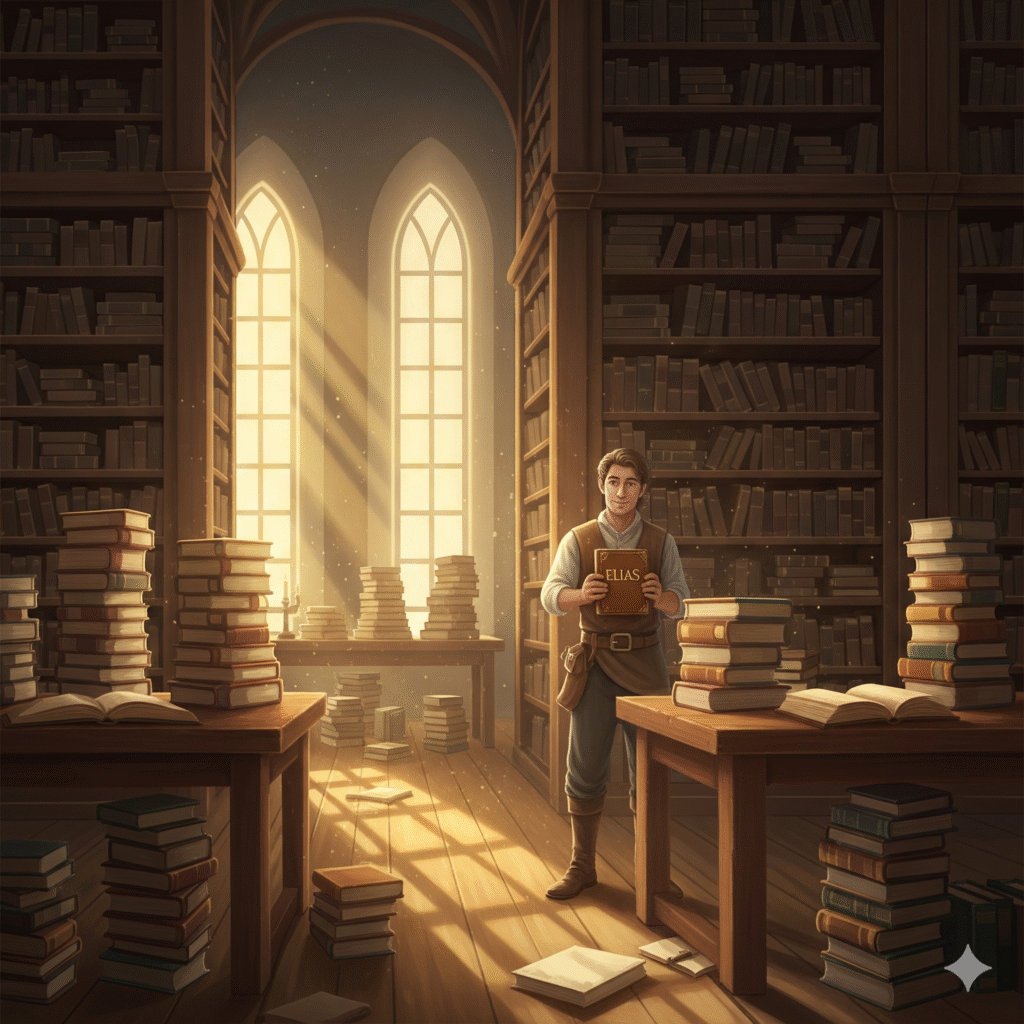
A Familiar Keeper
Inside, nothing had changed. The same librarian, though older now, gave him a warm smile. “I wondered when you’d come back,” she said, as though she had been expecting him.
A Book with His Name
Daniel wandered the aisles until he found a slim, leather-bound book. On the spine, in faded gold, was his own name. Startled, he opened it. Inside were his childhood doodles, half-written stories, and letters he once tucked between books. The library had kept them safe all these years.
Rediscovering His Voice
He spent hours there, reading words he had written as a boy. They were clumsy but full of wonder. And slowly, he began to write again not for deadlines, not for approval, but simply to feel alive.
Moral: What we love as children often waits quietly for us to return.
3. The Bridge Across the River

A Place Once Feared
When Clara was young, the old wooden bridge across the river terrified her. It swayed, groaned, and seemed too fragile to carry her weight. Yet it was the only way to reach her grandmother’s home on the other side.
Returning After Years
Decades later, after losing her grandmother, Clara returned to the village. The bridge still stood, worn but strong, its ropes mended, its planks polished by time.
Facing the Fear
Clara stepped onto it, her heart racing. The wood creaked, the river roared below, but with each step, she remembered her grandmother’s hand in hers. “Courage isn’t about not being afraid,” her grandmother used to say. “It’s about crossing anyway.”
A Healing Crossing
By the time Clara reached the other side, her fear had loosened its grip. She looked back at the bridge, realizing it had carried not only her body, but her grief, her memories, and her healing.
Moral: Some fears are meant to be faced twice once in childhood, and once in healing.
4. The Bakery at Dawn
Sweet Scents of the Past
As a boy, Julian often woke before sunrise to help his aunt in her bakery. The air always smelled of cinnamon, sugar, and rising dough. Life since then had been a blur of meetings and deadlines, but when he lost his job, he found himself wandering back to that little town.
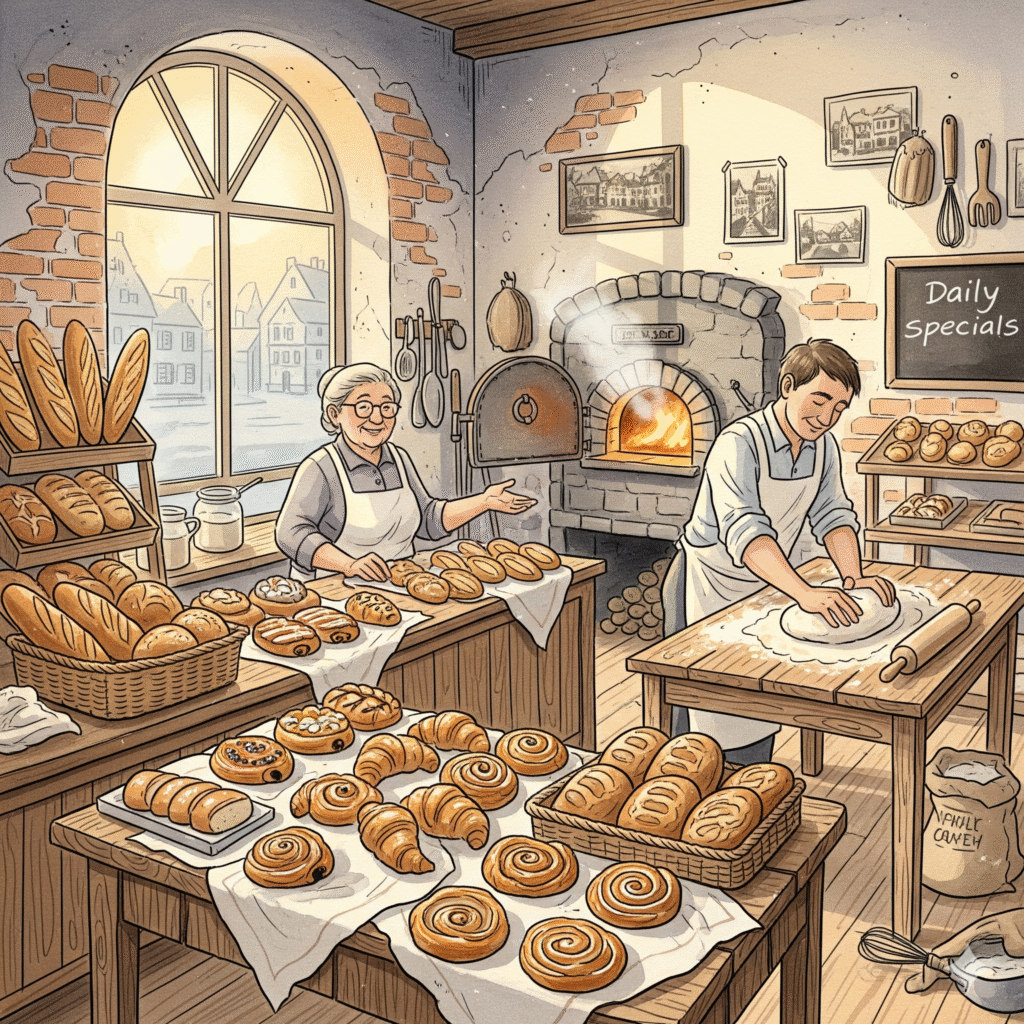
The Door Still Open
The bakery door creaked as he pushed it open, and there she was older, slower, but still smiling. “I knew you’d return,” his aunt said softly.
Kneading Away the Noise
Julian tied on an apron. His hands, though rusty, remembered the rhythm of kneading dough, shaping loaves, brushing pastries with golden glaze. The act itself felt like prayer.
A Different Kind of Success
By sunrise, he sat at a small table with his aunt, sharing warm bread and laughter. For the first time in years, he wasn’t chasing success he was tasting it.
Moral: True nourishment often comes from returning to the things that once fed your soul.
5. The Letter in the Oak Tree
A Childhood Tradition
Sophie and her best friend Elias once had a secret ritual they left letters for each other in the hollow of an old oak tree. Notes of dreams, fears, and promises, tucked away like treasures.
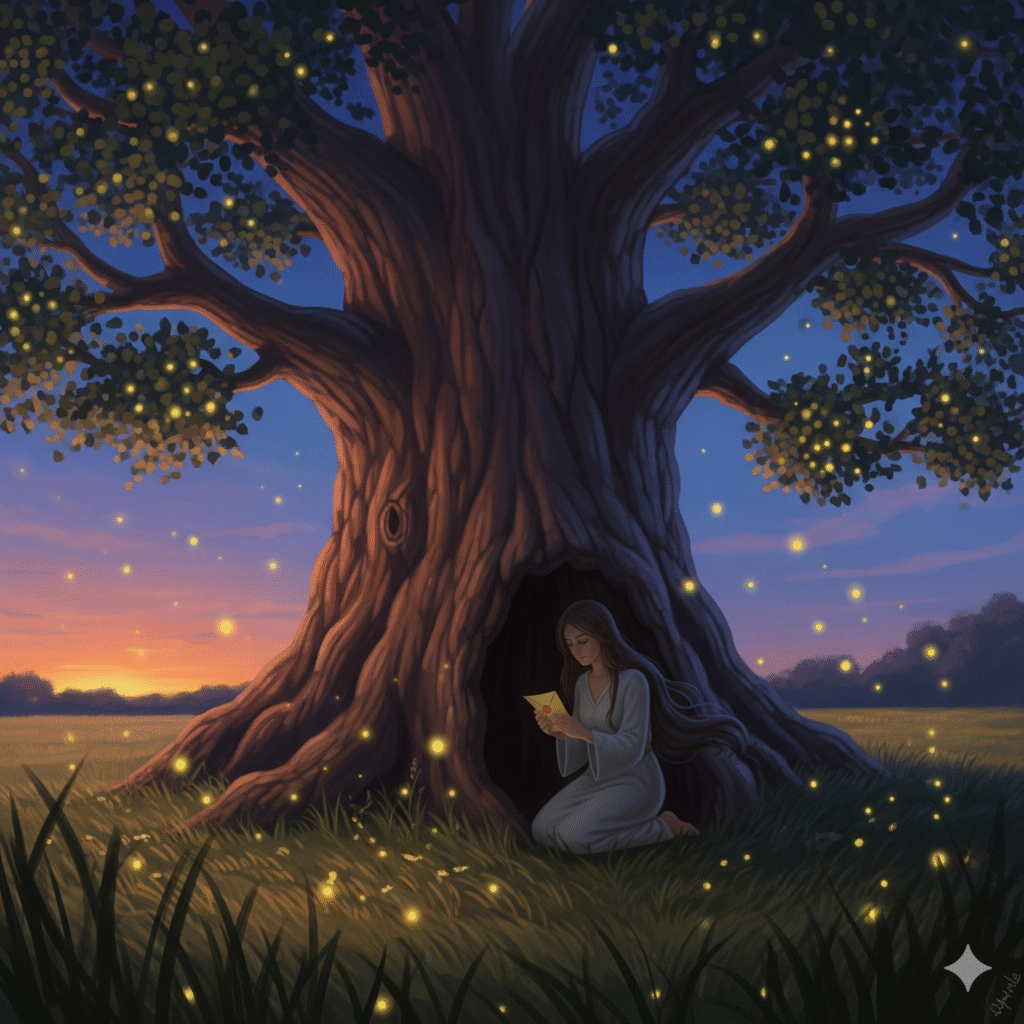
Years Later
Life took them apart. Elias moved abroad, Sophie stayed. But one summer evening, heavy with unspoken grief after her divorce, Sophie walked back to the oak tree.
The Surprise
Inside the hollow was a yellowed envelope addressed to her. Shaking, she opened it. The letter was from Elias, written years ago, saying, “If you ever feel lost, remember you are loved here, under this tree.”
A Silent Reunion
Sophie leaned against the oak, tears flowing freely. She didn’t know where Elias was now, but she felt his presence, his words wrapping around her like the embrace of childhood.
Moral: Some connections never fade they simply wait for the right moment to remind us we are not alone.
3.Gentle Fantasies & Whimsical Worlds
Unlike high fantasy or thrillers, these bedtime fantasies are slow-paced, lyrical, and full of wonder. There may be talking animals, floating cities, moonlit cafés, or stars that whisper but everything is gentle and dreamy, never chaotic.
4.Real-Life Slice of Calm
These stories focus on small moments making tea, visiting a farmer’s market, baking bread, mending old clothes, sitting by the fireplace. There’s no plot twist. Just gentle routines and emotional simplicity.
5. Philosophical or Thoughtful Narratives
These stories touch on themes like time, purpose, memory, love, or loss but gently, with room for interpretation and personal reflection. There’s often a wise character, a journal, a letter, or a quiet moment of realization.
Explore More Stories For Everyone
Conclusion: Let Stories Tuck You In
Adult bedtime stories are more than entertainment they’re a form of emotional care. Whether you seek calm, connection, escape, or quiet thoughtfulness, there’s a story style that meets you where you are.
So tonight, skip the screen.
About the Author
Namra Asim is a children’s storyteller and content creator passionate about weaving tales that inspire kindness, resilience, and imagination. She writes engaging bedtime stories that promote mindfulness, self-love, and inclusion, helping parents and educators spark meaningful conversations with kids. When she’s not writing, Namra explores creative ways to bring stories to life through articles, books, and storytelling resources.
👉 Follow more of Namra’s stories in Mindfulness Stories for Kids and Love Stories.

